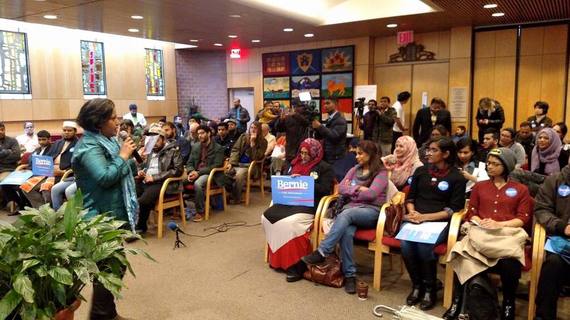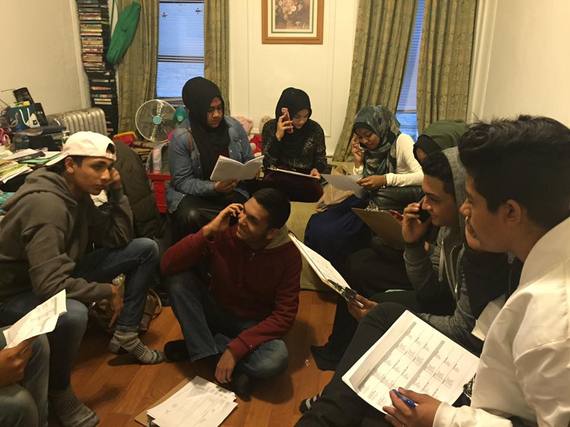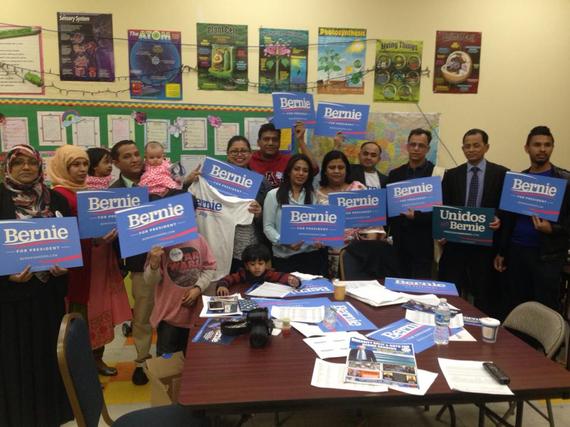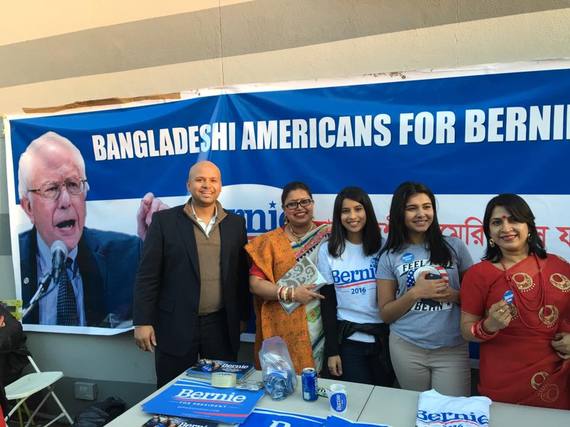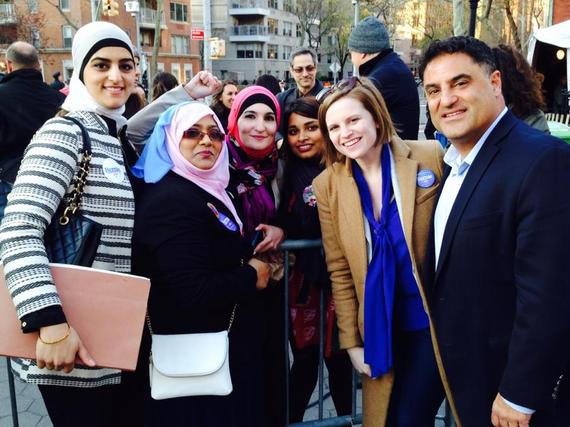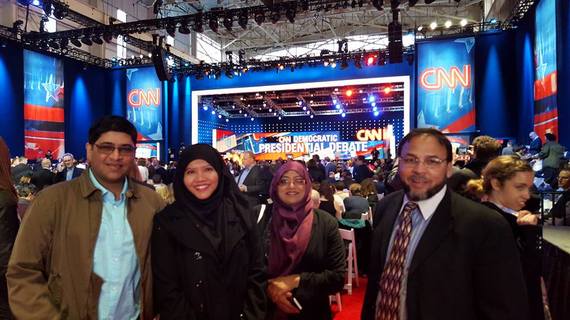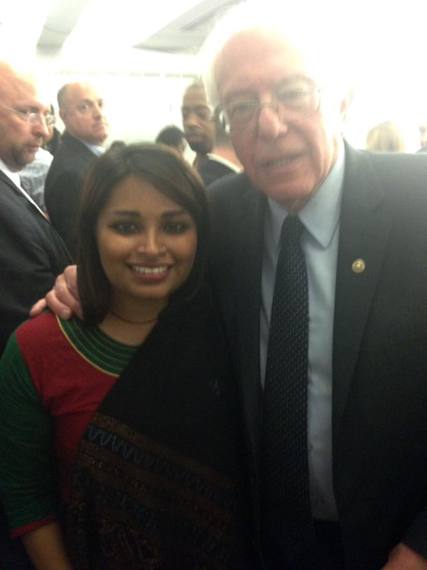In October of last year, in true Bengali fashion I waxed poetic about Bernie's stunning display of genuine empathy and solidarity with the Muslim American and immigrant American community and made the argument that both his personality and policies made him deserving of these communities' support.
Back then, Bernie was very much relegated as a "fringe" candidate with little hope of seriously challenging the Clinton machine for the Democratic nomination. Now the candidacy of Bernard Sanders is surging, dominating 9 out of the last 10 primaries and caucuses, an avalanche which began with a sweeping win in Democrats Abroad's Global Presidential Primary (in which I voted in).
Bernie Mama's Bengali Brigades
Brooklyn-born Bernie mama (uncle Bernie)'s biggest challenge--winning New York aka Hillary's Third Battle of the Hometown States--looms large. Yet Bernie and the broader progressive movement's commitment to fostering a genuine political revolution is real-- and as it has already been abundantly clear, Muslim Americans have been mobilizing right on the frontlines. One community in particular has been doing much of the heavy-lifting: The 277,000 plus strong Bangladeshi-American community.
The Bangladeshi vote is of course a large and coveted demographic for the upcoming New York primary on Tuesday, a state where the majority of America's Bangladeshi community calls home. Yet this community is also well represented in neighboring New Jersey, Maryland, DC, and of course California. It has a formidable presence in Michigan (especially in cities like Detroit and Hamtramck) and helped Bernie accomplish one of the biggest political upsets in American history.
So what makes Bangladeshi-Americans and so many other communities flock to Bernie?
In many ways, it is a natural fit. Bernie is after all the son of immigrants, and in many ways epitomizes both the fabled American Dream and the promise of America as embodied through "New York values":
"And you know what New York is? New York is a place built by the back-breaking work of immigrants. Immigrants like YOUR family, Ted Cruz....I AM the son of immigrants and I am proud of it!"
On a policy level, Bernie's decades-long commitment to a wide range of social justice issues has resonated with large sections of the Bangladeshi community. Perhaps the most high-profile endorsement of Bernie from the Bangladeshi-American community comes from human rights attorney, unyielding activist, and pillar of New York City's Bangladeshi community Chaumtoli Huq--the first Bangladeshi-American appointed as top counsel to the Public Advocate of the City of New York. Esquire Huq has been outspoken in her support for Bernie as well as the general need for Bangladeshi-Americans to appreciate the intersectionality of various social issues and stand in support of the candidate who will best advance those shared issues:
Some points to consider for the Bangladeshi community is that despite "model minority" myths, 1 in 3 of Bangladeshi live below the poverty line and are working in low wage and non-union jobs. Bernie's economic platform can lift up our families out of poverty.
She also points to the impact of Bernie's plan to offer tuition-free college education at public universities for admitted applicants:
Many immigrants come to US for an education, and public educational institutions like CUNY and SUNY system are destinations for many immigrant families. Bernie talks about tuition-free education, and that is important for us.
Fears about the rising wave of Islamophobia, xenophobia, racism, and other forms of bigotry remains an issue of paramount importance to Bangladeshi-Americans, and Bernie's unique background lends significant credibility to the belief that he will be a powerful ally for marginalized communities across America:
But the issue that seals the deal for me is that being a son of Polish immigrants, he understands the pains and challenges of immigrants. He also knows the fear of anti-Semitism and discrimination against Jews, and will be the first to fight Islamophobia and other forms of bigotry and intolerance.
Other community leaders have been outspoken in their support for Bernie as well. Community organizer and activist Murtajur Rahman has been at the forefront of efforts to mobilize the Bangladeshi community for this campaign, and is in an unique position to assess Bernie's economic policies:
"As a Wall Street banker, I know the average American has not had an increase in pay in over fifteen years. But the cost of living has gone up significantly. Bernie Sanders's proposal to increase the minimum wage to a $15 living wage and his consistent fight for the working and middle class is a step in the right direction for America."
Arif Ullah, who settled in New York from Bangladesh, expresses his faith in Bernie's immigration policies:
"I trust that Bernie Sanders will do right by immigrants if he becomes president, instead of doing what is politically expedient. His stance on comprehensive immigration reform has been as principled and consistent as his voting record on a variety of other important issues. Secretary Clinton, on the other hand, voted for a blatantly flawed immigration reform bill in 2007 that included a guest-worker program regarded as semi-slavery by the nationally-respected Southern Poverty Law Center. Yet, she criticizes Sanders for opposing that bill."
Queens resident and local community leader Hoshneara Begum has been instrumental in mobilizing New York's Bengali community to coordinate with other groups as well as organize community-specific initiatives to help Bernie's campaign. Mrs. Begun summed up her passion for supporting Bernie:
"I'm standing with Bernie because he is the only candidate fighting for the last 40 years for social justice and human rights"
On top of all of that, Bangladesh is on the absolute front-lines of the climate change struggle, placing the infant nation's very existence at stake. Bernie's unprecedentedly outspoken views on climate change-naming it as America's and the world's biggest national security threat-greatly resonates with a community who regularly worries about the well-being of their relatives and friends back in the motherland.
The Differences Matter
Given all the reasons this community has largely opted for Bernie, why not Hillary? After all, Bill Clinton is still fondly remembered in Bangladesh as "Bill Clean-Town" for his 2000 visit as President, as residents of Dhaka appreciated the fact that the city was scrubbed clean for the occasion for probably the first time in its history. In May 2012, Hillary also visited as Secretary of State during a time of intense political turmoil, giving the people of Bangladesh a temporary reprieve from the partisan carnage that was to come.
While serving in the Senate, both Bernie and Hillary voted the same way 92% of the time. Indeed if Bernie had not run, it is quite likely that Hillary could have counted on virtually all Bangladeshi-Americans for support.
Yet Bernie is running, and that remaining 8% matters-as do current differences in both substance and style. With regards to his "weakness" in foreign policy, Bernie has long been an activist for a range of international human rights issues, correctly predicted the disastrous fall-outs from both illegal invasions and unfair trade deals, and continues to advocate for a less interventionist and more human rights-centric foreign policy. In contrast, Hillary has supported wars in Iraq and Libya and continues to employ extremely hawkish language on Syria, Iran, and especially on Gaza and Palestine.
On domestic policies, Hillary "evolves" on so many issues that a debate between 2013 Hillary Clinton versus 2016 Hillary Clinton itself would constitute a fantastic GOP vs Dem Presidential debate. Meanwhile, Bernie has proven himself to be a virtual modern-day political Nostradamus with judgment and vision that far exceeds the vast majority of his peers--even if many times he was a one-man party ringing the alarm bells like that disheveled, frantic, elderly stranger who tries to warn everyone in every disaster and horror movie.
We all that one friend (or dozen) who insist that the candidates are virtually the same, and in particularly they are flabbergasted that voters could have such strong preferences for Bernie. Yet these differences do matter if it's your community that is preyed upon by the prison-industrial complex and one of the "Democratic" candidates accepts money from private prisons. They do matter if the sink faucet in your home sprays water than can be set ablaze, and if it's your children being poisoned, while one candidate supports fracking both here and all over the world, and readily accepts money from the oil and gas industry. They do matter if it's your relatives living abroad who are oppressed from a US-supported dictatorship or dodging bombs in the never-ending "war on terror", and one of the candidates is the highest recipient of contributions from the defense industry and as Secretary of State approved billions of dollars in arms sales to some of the most despotic regimes in the world after donations to her philanthropic donations.
Ignoring these differences is simply not a luxury that any of these communities can afford. Thus a hard truth emerges: Anyone who actually understands these very real (in many cases life-or-death) differences and still fails to appreciate them are no genuine allies of your community.
Uniting a Nation
Some folks worry that this fierce primary process is "dividing the Democratic party." Yet for millions of ordinary Americans, it seems that Bernie and this broader movement is simply conducting a long-overdue reformation of that party's priorities, and in the process is doing something far more important-uniting a country.
Bangladeshi-Americans in particular have always been civic-minded and politically active, but have never mobilized to this scale. For starters, this is perhaps the very first time an American political ad played on a Bangladeshi TV channel (you can check out the ad on the Bangladeshi Americans For Bernie Sanders Facebook page). Since then, the Bangladeshi community has held information sessions, organizing phone-banking sessions, and participated in major rallies across New York City.
These rallies include the Diversity Rally in Queens and the Get Out the Vote high-visibility canvassing event in Jackson Heights, both of which was conducted in close coordination with the Pakistani, Indian, Arab, Tibetan, Hindu, Muslim, Buddhist, and Christian communities and faith groups. Tibetan activist and writer Tenzin Dorjee
expressed his reason for supporting the movement:
"As an exile, as a minority, as a social justice activist and as a progressive, I see in Bernie a fierce advocate for the downtrodden, a man with a boldness of vision and vastness of compassion that is unprecedented. America has deviated so far from its founding principles that only a revolution can save it, and Bernie is the only revolutionary in the running."
In just the primary phase of this election, we are witnessing a historic and transcendent movement which is bringing together communities from all backgrounds. It's turning ordinary people into informed citizens by spreading knowledge on a range of critical issues, and is igniting conversations, activism, passions and energies in unprecedented ways.
If forward-thinking stalwarts of the Democratic party can recognize that American society is beginning the natural shift back from decades of moving to the right, and are willing to shift the Party's policies and priorities accordingly, the potential socio-political ramifications are huge. A big tent Dem party which now attracts progressives, independents and even disaffected Republicans is a much stronger party. And even more important, a party that attracts a newly invigorated, energetic, and inspired youth will allow it to have a long and bright future.
As both Mitt Romney and Jeb Bush painfully found out, you simply can't buy any of these things with any amount of money (thank God!) and their immense value to not just the party but to the country simply cannot be appraised in dollars. The benefits for the Democrats will be felt long after this election is over.
Creating a New Normal: The Revolution Has Already Begun
I am no one-issue voter, but Palestine has been an issue that I've cared about my whole life--as have my parents, and their parents. The bar for conversations about Palestine has historically been pathetically low (to the point where politicians in Israel can actually talk more freely about the Palestinian tragedy than our own can). Politicians and ordinary citizens alike have long shuddered to criticize Israeli policies for fear of being smeared as an anti-Semitic terrorist sympathizer
So as a grown 27 year old adult, I absolutely teared up when Bernie talked about the importance of the Palestinians' human rights and their right to live in dignity and peace.
I am no one-issue voter, but that exchange on Palestine--and Bernie's insistence on recognizing the human rights and dignity of the Palestinian people--was such a powerful moment in our country's political discourse. All my life, I had no real hope of witnessing or even dreaming about any kind of just solution to the Palestinian-Israeli crisis. Where once the very use of the word "balanced" or "neutral" by any serious politician was akin to being an anti-Semitic, treasonous terrorist sympathizer (and of course still is in some circles-See: AIPAC convention), Bernie has completely shifted the conversation and is making it perfectly acceptable for a major political figure to push for a fair and just solution for this conflict. He's rejuvenated and elevated the "two state solution" from a throwaway token punchline into an actual policy deserving of our country's utmost attention.
When Bernie lost a string of states in the South and Midwest on March 15, one of my cousins who has found time to canvass and organize for Bernie while earning his MD and MPH (yeah he's always been a badass) was quite disheartened. In response, I simply pointed to a self-evident truth: Bernie started something that simply cannot be stopped. The way he's running an issues-based campaign, funding it through public contributions, and running it through grassroots support, is itself revolutionary.
Regardless of what happens in New York or any other state, in a very real, concrete, and realizable way the revolution has already begun. This movement is turning discussions about a human rights-based foreign policy, wealth inequality, universal healthcare, and access to education from being "fringe ideas" to being part of our everyday socio-political discourse. It's turning these once "huge pie-in-the-sky ideas" into "the new normal"-into actual policies and goals deserving of our respect and support.
This new reality alone is worth every single dollar, article, social media activity, and phone bank call all of us ever gave/wrote/engaged in/made respectively. Things are indeed changing, as we witness the seeds of a historic political revolution growing versus entrenched establishment dynastic politics. Take it from a community who can spot both when they see them.
Special thanks to Bangladeshi Americans for Bernie for the photos, and to Chaumtoli Huq, Murtajur Rahman, and Hoshneara Begum for the quotes!

